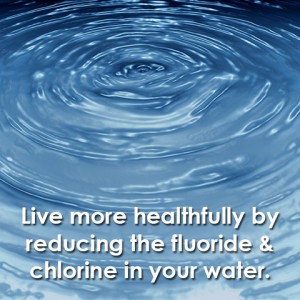 There is so much processed food, additives and other “junk” in our food these days. That’s why there is a growing movement to eat organic foods.
There is so much processed food, additives and other “junk” in our food these days. That’s why there is a growing movement to eat organic foods.
In the U.S., organic meat, poultry, eggs, and dairy products come from animals that are given no antibiotics or growth hormones. Organic food, in general, is produced without using most conventional pesticides; fertilizers made with synthetic ingredients or sewage sludge; bioengineering; or ionizing radiation.
So what does that say about non-organic food? I shudder to think.
So, with this post I’m starting a series of posts that I’ll publish over the next several weeks that will provide you with ideas for living a more organic life.
Tip 1. Reduce the fluoride in your water.
Faucet water contains fluoride in all 50 states. To remove it, purchase a reverse osmosis filter. A Britta filter won’t be enough.
Just so you know what kinds of effects too much fluoride can have, let me share my story. From the age of 3 to 5, I lived in East Africa. For health reasons, the fluoride content of the water there was very high. This caused a greenish-black substance to grow on my teeth. In fact, many children of the time had black teeth.
When we returned to the States, I had to have my teeth cleaned of this substance every three months for several years. I even had to use non-fluoride toothpaste, and did so until finding such a toothpaste became near impossible.
Tip 2. Reduce the chlorine in your water.
Chlorine is used in drinking water to combat microbial contamination. However, it can react with organic matter in the water and form dangerous, carcinogenic Trihalomethanes. In 1992, a study published in the American Journal of Public Health, found that people who regularly drink tap water containing high levels of chlorine by-products have a greater risk of developing bladder and rectal cancers than people who drink unchlorinated water.
The good news is that chlorine in water will evaporate after a few hours. So, to get rid of the Trihalomethanes, use a water pitcher with a carbon filter and then leave it in your fridge overnight to let the chlorine evaporate.
Tip 3. Stop using plastic water bottles.
Though Nalgene bottles are BPA-free, they’ve been found to leech other chemicals. Use glass bottles to be 100% safe. This is especially true if you are leaving your water bottle in the car. When your car, and therefore the water, heats up, it increases the speed of the leeching. If you can’t use a glass bottle for the car, find one of the stainless steel water bottles currently on the market.
Tip 4. Don’t bother with anti-bacterial soap.
Avoid soap labeled as “anti-bacterial.” First, pretty much all soap will kill bacteria. And second, residue on dishes and hands from these “special” soaps can get into your stomach and kill your “good bacteria.”
Tip 5. Use coconut oil to cook with.
Cooking with coconut oil is better than olive oil. It has more Omega-3s and doesn’t oxidize in sunlight or high temperatures. Olive oil is better used for flavor than for cooking; and if used in cooking, only at low temperatures.

Take Charge of Your Health!
Changing your eating habits can be tough. But it doesn’t have to be if you take a little time to think it out and create a plan.
This Healthy Eating Worksheet will walk you through the process of creating a healthy eating plan. All you need to do is print it out, set aside some time to complete it, and then fill it out. Then you can create your plan, knowing that you have addressed potential obstacles and came up with some creative ways to handle them.



Pingback: Organic Living Tips: Better Toothpaste | Carma's Cookery
Pingback: Organic Living: 5 Tips for a Healthier Diet | Carma's Cookery
Pingback: Organic Living: Change your buying habits - Carma's Cookery
Pingback: Organic Living: Farm Fresh Foods - Carma's Cookery